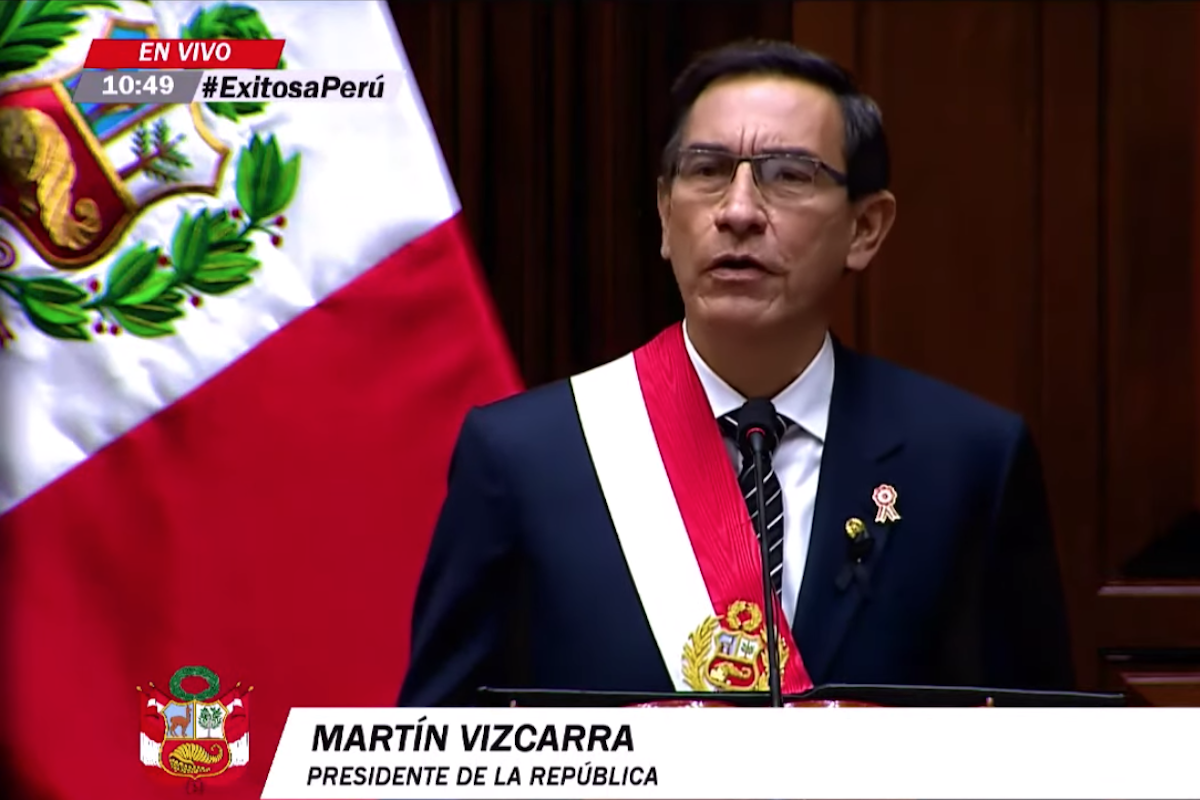

Martín Vizcarra on July 28, 2020 during his State of the Union speech.
NEWARK — Since I can remember, every July 28 in Peru was a celebration. I recall the streets of my town, Magdalena del Mar, dressed in red and white. Flags waving left to right outside of every house. And the several food festivals across the capital, Lima.
We lived 45 minutes from Plaza de Armas, where 199 years ago on July 28, 1821, El Libertador Don José de San Martín declared that Peru was free from colonial Spain power. Since then, every year, hundreds gather to celebrate Peru’s independence. I went twice, and the sight was impressive.
On this past Tuesday July 28, a year before a bicentennial celebration, Plaza de Armas was empty because of the global pandemic. President Martín Vizcarra, during his last State of the Union address, tried to bring hope to a country badly battered by COVID-19.
#ElPerúPrimero pic.twitter.com/R3JK96fMhU
— Martín Vizcarra (@MartinVizcarraC) July 28, 2020
“Our country may be attacked by crisis, wars or pandemics, but the courage, the pride and the faith of the Peruvians remain firm and unscathed,” Vizcarra said during his speech. “Today, as before, we have a duty to continue responding with integrity and conviction. May the unwavering spirit that has defined our past lead us into the future.”
Vizcarra spent the nearly two hours that lasted his speech in breaking down what his cabinet has done since the pandemic started, and provided several promises, such as the construction of six new hospitals throughout the country, and another stimulus payment for vulnerable families between August and October of this year. He also talked about investment in infrastructure as well as the creation of thousands of jobs.
However, political analysts have said the speech lacked concrete plans on how these promises will be implemented.
“Some of us had expectations of something more specific and perhaps something wrapped up in the historical sense of the circumstances in which we find ourselves,” lawyer Erick Sablich said on local news outlet RRP. “There are some interesting announcements, but they have not been landed.”
Another criticism is how the president wants to be remembered after he leaves office next year.
“The head of state seeks to build the image of a conciliatory president in search of unity,” political analyst Mabel Huertas said in El Comercio. “The president wanted to give a list of successes achievements during the pandemic, but have not necessarily been effective or efficient, such as the emergency decree to deal with the coronavirus in native communities, which was a late intervention. It also tries to give the image of a conciliatory president, who will lead us to unity in this last section.”
Finally, the speech lacked self-criticism from the government amid several corruption charges that have haunted Vizcarra’s term.
“A modest dose of self-criticism would have been desirable since the failures in health policy committed during confinement and the delay —not to say inaction— in taking measures to reactivate the country’s productive apparatus, which to this day maintains sectors trapped in a bureaucratic nebula that is leading to ruin,” local newspaper Peru21 wrote.
Vizcarra was appointed president in 2018 when former President Pedro Pablo Kuczynski resigned amid corruption scandals. Since then, these past two years, Perú have been involved in political turmoil.
In July 2018, four months after Vizcarra became president, phone conversations were leaked between judges and prosecutors trade money and favors in exchanged of helping convict criminals and secure jobs for friends. In October of last year, Vizcarra dissolved congress in his fight against corruption.
At the end of the speech, Vizcarra walked for the last time to the Government Palace, as per tradition. The streets —that before the pandemic was crowded with people waving flags and wearing the national soccer team jersey— were empty.
After hearing the last state of the union address, it is hard not to think about what is going on in my home country. Uncertainty and hardships await, not only in Peru but in the world. Self-criticism was the main criticism of this government, and perhaps it should be ours as well. Once we become self-critical of how our actions (good and bad) are affecting our country (both here and abroad), then we will be able to take change of the direction of our future.
***
Diego Jesús Bartesaghi Mena is a 2020 Latino Rebels summer correspondent. A recent graduate of Columbia Journalism School, he is based in Newark, NJ and tweets from @bartesaghi_mena.


